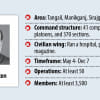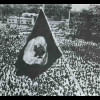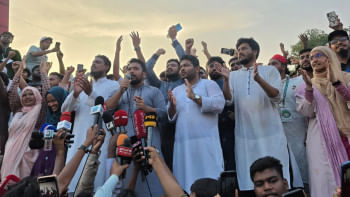Remembering my teacher Dr Jyotirmoy Guhathakurta

On the fateful night of March 25, 1971, Prof Jyotirmoy Guhathakurta was dragged out of his university flat and shot repeatedly on the back by the Pakistan Army. He died later in the Dhaka Medical College Hospital on March 30, 1971. The following is a tribute to the martyred professor.
If Jyotirmoy Guhathakurta sir were alive today, he would have turned 103 in July. I was fortunate enough to be in his tutorial class both in my second and third years. In 1967, when I was a first-year student at Dhaka University, JGT – as we used to call him – had just returned from the UK after completing his PhD. He was 47 years old, slightly balding, always smiling, a trifle portly. I'm more than 50 years too late with this tribute, but I'm still grateful to be able to write the following words.
I remember often seeing JGT hanging around at the end of the dark corridor near the mezzanine floor (between the Department of English and the Department of International Relations) where he had his office, sometimes smoking a cigarette, often chatting with senior students walking by. He was the only teacher who did that, the only teacher who seemed to enjoy talking to students. Years later, in the early 1980s (1981-85), that office was mine coincidentally. I felt a secret pride in having the same room that JGT used to have.
I remember eagerly waiting for his lectures in the second year (1968-69). In the promotion test from first year to second year, I had done rather well, so when we started attending his classes on Swinburne's Atalanta in Calydon, he already knew me by name. Incidentally, Swinburne and his use of classical myths were one area of his PhD research. He often called upon me and a few other class friends to take on dramatic roles from the play and read aloud in class. I was not particularly good at it and didn't enjoy the experience, but it did feel good to be singled out by him. Interestingly, when I was doing my PhD in Canada about a decade later, I once wrote a term paper on Swinburne's interest in the Italian revolutionary Mazzini in Songs before Sunrise. I certainly had Guhathakurta sir in mind.
In the English department, you get to know your teachers better in the tutorial classes. The teachers also get to know students much more closely in these small classes. I had tutorial classes with JGT both in second year and third, so I got to know him better than the other teachers. I remember once getting a B++ for a paper on Pope's The Rape of the Lock, and JGT sir could see that I wasn't too happy with that grade. He said to me with a big smile that I really had not given too much effort on that tutorial, and then he added that if I spent less time hanging around the corridors of the department and more time studying, I could really do well. I have written about this elsewhere, but let me repeat that JGT's words made me "ambitious" academically for the first time in my life, and I did well in my Honours and MA exams. I owe this to Jyotirmoy Guhathakurta sir. A few words of encouragement, a small gesture of appreciation from a teacher can work wonders for a student. He was that kind of a teacher.
I remember that on the morning of March 27, 1971, when curfew was lifted for a few hours, I walked from our house in Dhanmondi to Iqbal Hall (now Sgt Jahurul Haq Hall). There I saw about eight or nine bodies lined up.
Tragically, we lost him too early. We only had him for a little over two years. I did enjoy the special privilege of being invited to his house in Gandaria, where he lived with his wife and daughter (Dr Meghna Guhathakurta). His wife Bashanti Di, as she was known, was the headmistress of a school, and their house was located within the school compound. On that occasion, JGT gave me Buddhadeva Bose's novel Golap Keno Kalo to read. Set in the 1930s and 40s, the novel gives a wonderful account of Dhaka in those decades, and of Buddhadeva Bose's own experiences in the English department. I remember one paragraph where the great writer talks about the "unreadability" of Spenser's The Faerie Queene. This had a direct impact on me. When I was preparing for my Honours final exam, I found Spenser's allegory equally unreadable and decided not to read it, like Buddhadeva Bose.
Besides tutorial classes, departmental picnics afforded opportunities for students to get close to teachers, and for teachers to show their more "human" face to students. In late 1969 or early 1970, we were at a picnic with JGT and other teachers which involved a river cruise up and down the Buriganga River. JGT was a smoker. We watched him trying to light a cigarette and the wind blowing out the matchstick every time he tried. Then he approached a group of us, sitting close to him; cupping his palms expertly around the flame, one of us managed to light JGT's cigarette. It might have been me, for I was an expert smoker in those days. JGT was the only teacher who smoked. I would have enjoyed a smoke with JGT and I feel certain he would have offered me a cigarette if he were around when I joined the department in 1973. It is a terrible tragedy for the department and for the nation that we lost him so early.
I remember that on the morning of March 27, 1971, when curfew was lifted for a few hours, I walked from our house in Dhanmondi to Iqbal Hall (now Sgt Jahurul Haq Hall). There I saw about eight or nine bodies lined up. In a state of shock, I was walking towards Jagannath Hall when I met a friend who stopped me from going there. He told me about the killings in the hall and also told me that Jyotirmoy Guhathakurta sir had been shot by the Pakistan Army.
It was much later that I learnt, mostly from written narratives and television interviews given by JGT's daughter Dr Meghna Guhathakurta, how he actually died. Meghna's account is obviously the most authentic. Most people know what happened. On the night of March 25, a bunch of Pakistani soldiers led by a young officer entered their university flat, asked for the professor, took him out, and shot him in the back in cold blood. For two nights and a day, JGT's wife and his teenage daughter tried to staunch the bleeding, too scared to go to the hospital, just a stone's throw away. They took him to the hospital after curfew was lifted on March 27, but it was too late. He died on March 30 from too much loss of blood.
For those of us who knew him personally, it was an immeasurable loss. When I started teaching in the department about a year later from August 1973, I often thought of JGT, missed not being able to drink tea with him in the lounge, maybe even smoke a cigarette. Personally, it was a great loss not having him around as a colleague and a mentor. I came to know later that Jyotirmoy Guhathakurta sir was a follower of MN Roy's "Radical Humanism" in his youth. In the 1920s and 30s, the radical humanists believed in the armed overthrow of the British government. It certainly would have been wonderful to hear him talk about our own armed struggle against the Pakistanis. It's a great honour to be able to write about JGT to bring alive my memories of a wonderful person and an inspiring teacher.
Dr Shawkat Hussain taught at the Department of English of Dhaka University.

 For all latest news, follow The Daily Star's Google News channel.
For all latest news, follow The Daily Star's Google News channel. 










Comments